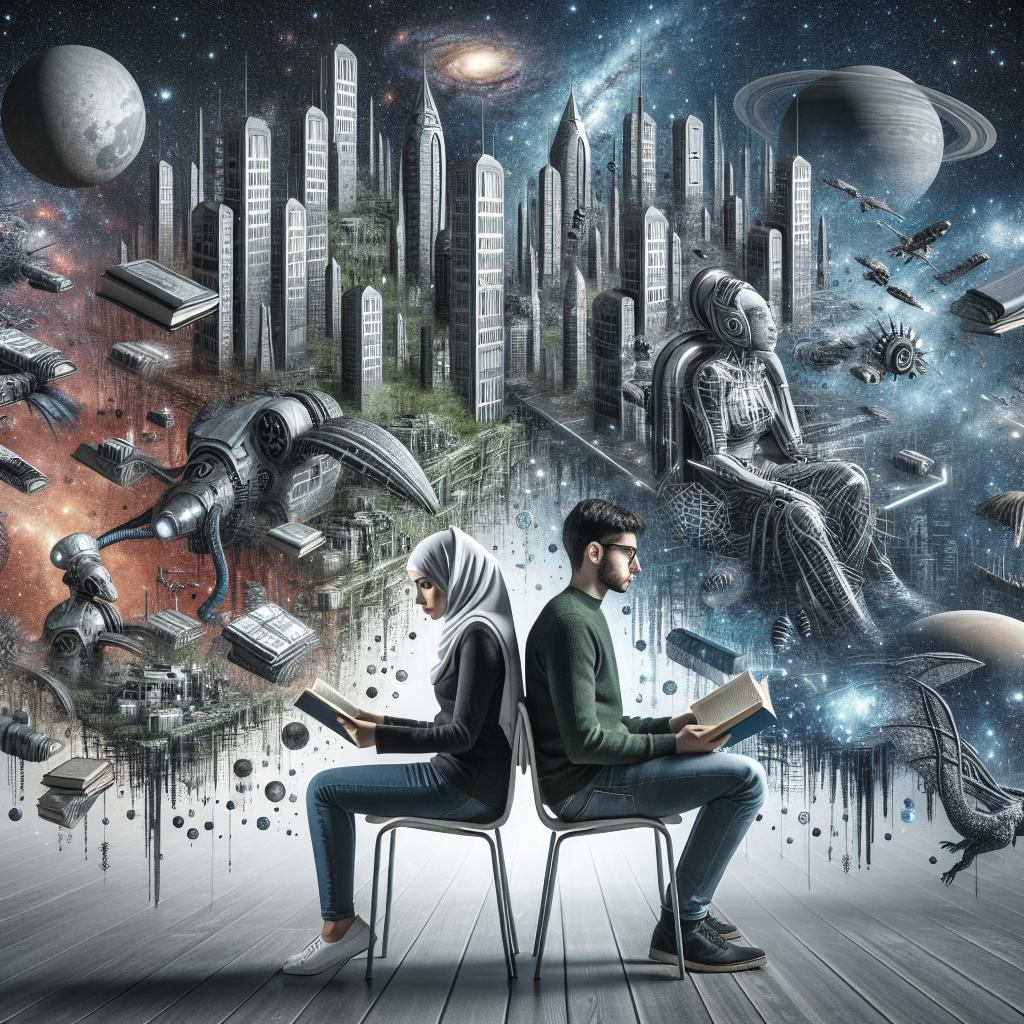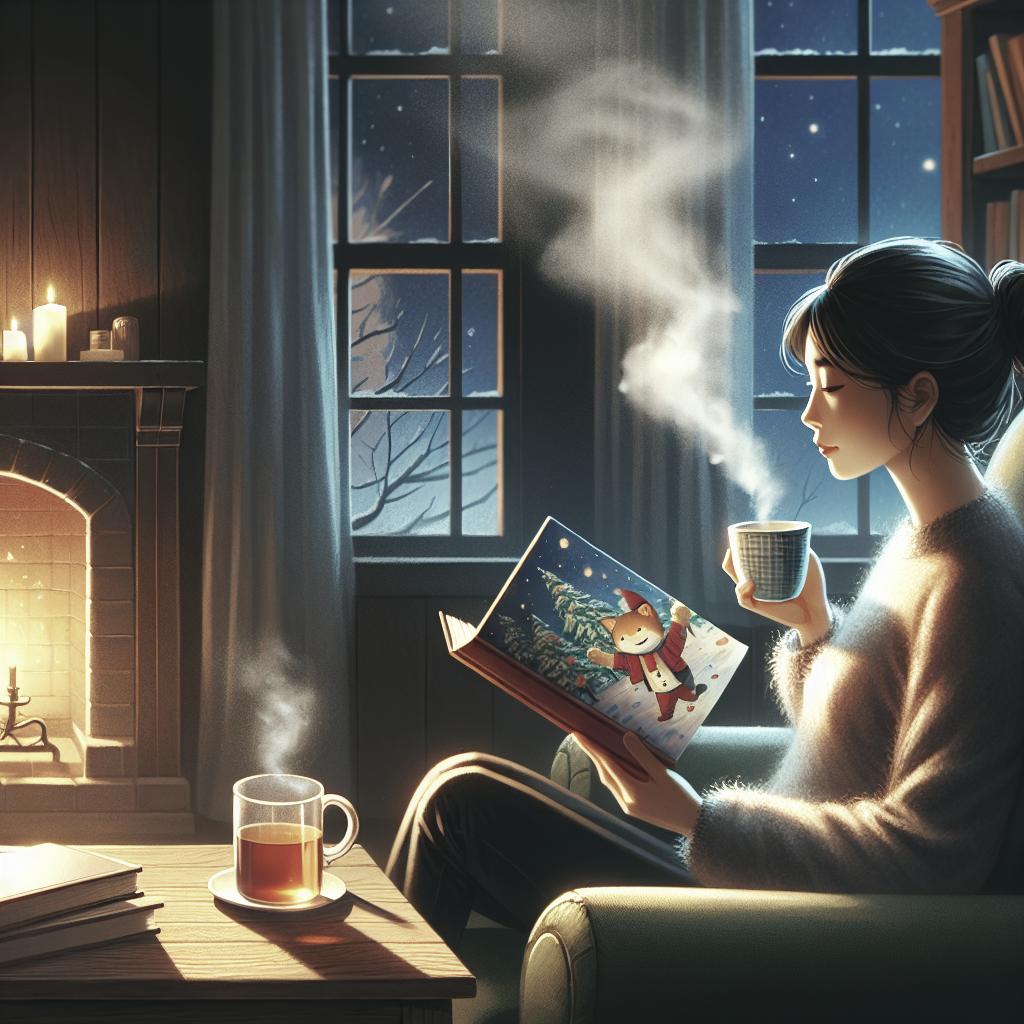Top Science-Fiction Novels for Escapism
In these turbulent times, escapism has never been more valuable, and what better way to dive into another world than through the riveting lens of science fiction? From interstellar adventures to dystopian landscapes, science-fiction novels provide an unparalleled retreat into the imagination. In this post, we will explore some of the most acclaimed sci-fi novels that captivate hearts and minds alike. Whether you’re a seasoned sci-fi enthusiast or a curious newcomer, these works promise an unforgettable journey. Our list, while not exhaustive, spotlights some standout stories that invite readers to escape into the limitless possibilities of their pages.
The Ultimate Hitchhiker’s Guide to the Galaxy by Douglas Adams
Douglas Adams’s “The Ultimate Hitchhiker’s Guide to the Galaxy” offers a whimsical and satirical journey through the cosmos. With its roots firmly planted in comedic science fiction, this series creatively lampoons human society through the eyes of Arthur Dent, an unwitting Earthling thrust into interstellar adventures. The narrative is a masterful blend of humor, absurdity, and profound philosophical musings.
The brilliance of Adams’s narrative lies in its clever plot twists and the colorful cast of characters that dot the story’s universe. From the paranoid android Marvin to the enigmatic Zaphod Beeblebrox, these characters provide humor and depth, challenging readers to ponder humanity’s place in the vastness of space. For those looking for a light-hearted escape with a hefty dose of wit, this series is a delightful odyssey beyond the everyday.
The Three-Body Problem Trilogy by Liu Cixin
Liu Cixin’s “The Three-Body Problem” trilogy has garnered global acclaim for its intricate weaving of hard science with speculative fiction. The series starts on Earth, where an impending alien invasion is revealed, rippling through the world’s scientific community. Cixin’s work is a testament to the power of human intellect when faced with cosmic threats, spurring readers to soar into an unknown world that is both captivating and deeply thought-provoking.
The trilogy challenges conventional paradigms by intertwining advanced alien civilizations with the cultural revolution’s influence on scientific progress. Its gripping storyline and profound philosophical questions offer both an escape and a confrontation with humanity’s potential future. Readers will find themselves captivated by its unique narrative style and novel approach to complex scientific concepts.
The Circle by Dave Eggers
Dave Eggers’ “The Circle” explores the blurred lines between privacy and technology in a modern setting. This dystopian narrative centers around Mae Holland, who lands a dream job at a powerful tech company that aims to integrate every aspect of human interaction within a singular platform. As Mae digs deeper into the workings of The Circle, unsettling truths about connectivity and personal freedom come to light.
The novel cleverly critiques contemporary society’s dependence on digital interfaces and questions the ethical boundaries of technological advancement. Its chilling portrayal of a digital dystopia becomes a seemingly plausible fear, captivating readers in its foreboding reality. Eggers’ introspective style encourages readers to reflect on interpersonal connection and the digital age’s moral ambiguities.
The Undertaking of Hart and Mercy by Megan Bannen
In “The Undertaking of Hart and Mercy,” Megan Bannen presents a fantastical setting where the divide between life and death narrows. Although primarily a romance, its enchanting fantasy elements paint an immersive world steeped in charm and originality. Hart, a delivery man, and Mercy, a scribe, find themselves intertwined in a magically animated narrative that touches on themes of love, grief, and renewal.
This novel is perfect for readers seeking both romance and a mystical retreat from reality. Bannen’s ability to forge genuine connections within her narrative craft allows readers to escape into an emotionally resonant, otherworldly experience. Fans of magical realism will relish the imaginative storytelling and vibrant, lush landscapes that populate Hart and Mercy’s escapades.
The House in the Cerulean Sea by TJ Klune
“The House in the Cerulean Sea” by TJ Klune is a heartwarming tale of acceptance and found families, set against the backdrop of a bureaucratic fantasy world. The story follows Linus Baker, a by-the-rules caseworker, as he evaluates a home for magical children under the direction of the enigmatic caretaker Arthur Parnassus. What unfolds is a delightful examination of societal norms and the inherent value of diversity.
Klune’s narrative excels with its rich character development and a comforting portrayal of unlikely friendships. The whimsical settings and charming characters make it an ideal escape for readers who relish tales of otherness and marginalized voices. As Linus discovers the magic within himself and others, readers are gently reminded of humanity’s capacity for warmth and acceptance, offering an inspiring substitute to the everyday grind.
Terra Nullius by Claire G Coleman
Claire G Coleman’s “Terra Nullius” is an evocative exploration of colonialism, presented through the speculative lens of science fiction. The novel paints a striking parallel between an alternate world and Earth, reflecting the displacement and identity struggles faced by Indigenous populations. Its poignant narrative progression serves as both a powerful allegory and a reverent nod to the experiences of colonized peoples.
Coleman’s adept use of genre elements enhances her storytelling, allowing readers to delve into themes of power, oppression, and survival. As the tale unfolds, it challenges audiences to consider their understanding of history, making it a potent escapist fiction rooted in profound social justice discourse.
Magician by Raymond E Feist
Raymond E Feist’s “Magician” is a staple of high fantasy that promises a grand adventure into the mythical land of Midkemia. This epic saga follows Pug, an unlikely apprentice, as he traverses a world of magic and war. With masterful world-building and a sweeping tale of heroism, the novel envelops readers in its richly crafted fantasy landscape.
Feist’s work captivates with its intricate lore, compelling character arcs, and exploration of complex themes such as power, destiny, and friendship. For readers seeking to immerse themselves in a world where the ordinary become extraordinary, “Magician” offers endless opportunities for escapism, making it a quintessential journey in fantasy literature.
The Nevernight Chronicle by Jay Kristoff
Jay Kristoff’s “The Nevernight Chronicle” is an epic tale of revenge and ambition set within a realm where the sun never sets. The story follows Mia Corvere, a young assassin attending a deadly school for killers, on her quest for vengeance against those who wronged her family. The brutal yet imaginative world is filled with dark magic, intrigue, and betrayal.
Kristoff’s evocative prose and distinctive narrative style offer readers a gripping adventure through a unique setting, infused with vivid imagery and dynamic characters. Those seeking a darkly fantastical retreat from reality will appreciate the series’ complex moral dilemmas and intricate plot, which draw readers into its alluringly shadowed depths.
Exhalation by Ted Chiang
Ted Chiang’s “Exhalation” is a short story collection that delves into profound themes of existence, machine consciousness, and the nature of the universe. Each piece invites readers to slip into meticulously crafted worlds where scientific inquiry meets philosophical exploration. Chiang’s narrative technique gracefully melds speculative elements with emotional resonance.
His stories provoke deep reflection, urging readers to question the threads of reality and the constructs of consciousness. A masterwork of speculative fiction, “Exhalation” offers an introspective escape, perfect for those yearning to contemplate life’s grand questions through compelling, thought-provoking narratives.
The Murderbot Diaries by Martha Wells
Martha Wells’ “The Murderbot Diaries” is a fresh take on the sci-fi genre, following a self-aware security android that refers to itself as “Murderbot.” Desiring nothing more than solitude, Murderbot embarks on a journey of self-discovery, defying its programming while uncovering human motivations and vulnerabilities.
Wells’ compelling storytelling and sardonic humor engage readers while subtly addressing themes of autonomy, identity, and corporate exploitation. A delightful escape for fans of character-driven narratives, this series offers both excitement and introspection, wrapped within the veneer of space travel.
The Sandman by Neil Gaiman
An iconic contribution to graphic literature, Neil Gaiman’s “The Sandman” is a sprawling narrative that journeys through the realms of dreams and myth. The story follows Dream, also known as Morpheus, as he navigates a universe that intertwines human reality with fantastical elements. Gaiman wields his narrative prowess to sculpt a tale rich in mythology and existential contemplation.
The series’ unique blend of gothic aesthetics and philosophical depth provides a distinctive escapist experience. Gaiman’s dreamlike storytelling echoes beyond the page, pulling readers into a liminal space between reality and reverie—an essential read for those seeking to explore the boundless expanse of imagination.
The Broken Earth Trilogy by NK Jemisin
“The Broken Earth Trilogy” by NK Jemisin is a genre-defining saga that reshapes the landscape of speculative fiction. Set on a world plagued by cataclysmic seismic activity, the series introduces orogenes—individuals with the power to harness the earth’s energy. Through intricately woven narratives, Jemisin boldly addresses themes of oppression, survival, and environmental catastrophe.
The trilogy’s visionary world-building and multifaceted characters offer a profound escapist journey, challenging readers to examine structural inequities and resilience. As a groundbreaking work, it defies conventional boundaries, captivating audiences with its compelling storytelling and thematic richness.
How to Live Safely in a Science Fictional Universe by Charles Yu
Charles Yu’s “How to Live Safely in a Science Fictional Universe” is a playful and inventive exploration of temporal dislocation and self-discovery. The protagonist, also named Charles Yu, navigates a fragmented universe in his time machine, exploring loops of memory, regret, and familial bonds.
Yu’s narrative is a poignant and humorous contemplation of existence within a meta-textual landscape. Readers seeking an escapist literary experience imbued with wit and questions about time and identity will find solace in Yu’s intriguing, self-reflective universe.
The Truth by Terry Pratchett
Terry Pratchett’s “The Truth” is a satirical tour de force exploring the power of media and misinformation in the Discworld universe. In this novel, the characters grapple with the transformative impact of a new invention—the printing press—and the ensuing chaos it brings to the streets of Ankh-Morpork.
Pratchett’s wit and insightful social commentary provide readers with an engaging narrative that scrutinizes the nature of truth and storytelling. For fans of satirical escapism that provokes laughter and thought, “The Truth” remains a timeless exploration of the quest for integrity in a complex world.
Every Version of You by Grace Chan
Grace Chan’s “Every Version of You” delves into the intersection of technology, identity, and relationships in a speculative future. The novel presents a world where humans can upload their consciousness into a digital realm, exploring questions of authenticity and self-discovery. As its protagonists confront this new reality, Chan deftly examines the nuances of love and identity in the digital age.
This thought-provoking escapist fiction resonates with readers through its exploration of technological advancements and the eternal quest for meaning and connection. Insightful and imaginative, “Every Version of You” invites readers to reflect on the endless iterations of self and the profundity of human connection.
Future Prospects
| Book Title | Author | Key Themes |
|---|---|---|
| The Ultimate Hitchhiker’s Guide to the Galaxy | Douglas Adams | Humor, Philosophy, Satire |
| The Three-Body Problem Trilogy | Liu Cixin | Science, Alien Civilizations, Human Resilience |
| The Circle | Dave Eggers | Technology, Privacy, Dystopia |
| The Undertaking of Hart and Mercy | Megan Bannen | Fantasy, Romance, Renewal |
| The House in the Cerulean Sea | TJ Klune | Acceptance, Diversity, Found Family |
| Terra Nullius | Claire G Coleman | Colonialism, Identity, Power |
| Magician | Raymond E Feist | Fantasy, Magic, Heroism |
| The Nevernight Chronicle | Jay Kristoff | Revenge, Ambition, Dark Magic |
| Exhalation | Ted Chiang | Existence, Consciousness, Technology |
| The Murderbot Diaries | Martha Wells | Autonomy, Identity, Humanoid Experience |
| The Sandman | Neil Gaiman | Dreams, Mythology, Existence |
| The Broken Earth Trilogy | NK Jemisin | Catastrophe, Power, Survival |
| How to Live Safely in a Science Fictional Universe | Charles Yu | Time, Identity, Self-Discovery |
| The Truth | Terry Pratchett | Media, Truth, Satire |
| Every Version of You | Grace Chan | Technology, Identity, Connection |


